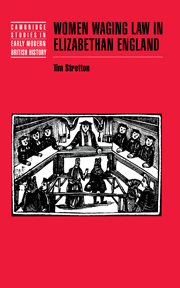Book contents
- Frontmatter
- Contents
- Lists of maps and figures
- List of tables
- Preface
- Notes on the text
- Abbreviations
- 1 Introduction
- 2 Women, legal rights and law courts
- 3 Female litigants and the culture of litigation
- 4 The Court of Requests
- 5 Unmarried women and widows
- 6 Married women in Requests
- 7 Freebench, custom and equity
- 8 Pleading strategies in Requests
- 9 Women waging law
- Glossary
- Bibliography
- Index
- Cambridge Studies in Early Modern British History
5 - Unmarried women and widows
Published online by Cambridge University Press: 11 November 2009
- Frontmatter
- Contents
- Lists of maps and figures
- List of tables
- Preface
- Notes on the text
- Abbreviations
- 1 Introduction
- 2 Women, legal rights and law courts
- 3 Female litigants and the culture of litigation
- 4 The Court of Requests
- 5 Unmarried women and widows
- 6 Married women in Requests
- 7 Freebench, custom and equity
- 8 Pleading strategies in Requests
- 9 Women waging law
- Glossary
- Bibliography
- Index
- Cambridge Studies in Early Modern British History
Summary
Widow Blackacre: You shall hear me, and shall be instructed. Lets see your Brief.
Mr Petulant: Send your Solicitor to me, instructed by a Woman! I'd have you to know, I do not wear a Bar-gown – –
Widow Blackacre: By a Woman! And I'd have you to know, I am no common Woman; but a woman conversant in the laws of the Land, as well as your self, tho' I have no Bar-gown.
William Wycherley The Plain Dealer (1676)In the eyes of the law, single women and widows had full legal capacity. When considering women's rights it is consequently a mistake to study only those areas of the law obviously associated with women, such as jointure, dower, marriage settlements and separate estates. Such a focus can be misleading, for two reasons. First of all, it ignores the fact that in theory adult women without husbands were litigants like any others, free to go to court over the same issues as men. In practice this meant not just dower and jointure, but debts, bonds, contracts, property transactions, inheritance and a host of other matters. Secondly, for reasons connected with the legal restrictions wives suffered during marriage, women in sixteenth century England rarely played as dominant a role in litigating their own marriage settlements and separate estates as logic might suggest. They took part in marriage negotiations, but only occasionally did they participate in court actions when negotiated agreements failed.
- Type
- Chapter
- Information
- Women Waging Law in Elizabethan England , pp. 101 - 128Publisher: Cambridge University PressPrint publication year: 1998
- 1
- Cited by

